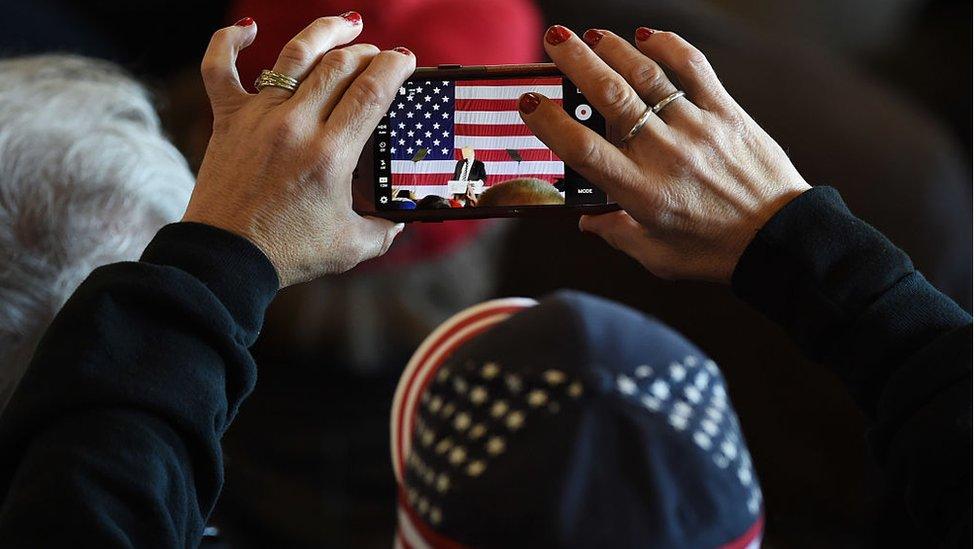iPhones and sex toys may cost more if there's a US-China trade war
- Published

Imported smartphones could cost Americans more if there's a trade war
Donald Trump may be accused of flip-flopping on many issues, but there is one thing he's been remarkably consistent on: China.
A nation that's "raping our country", he called it on the campaign trail. One that is "stealing American jobs".
He's promised to slap a 45% tax on Chinese imports if Beijing doesn't start playing fair - a move that's led to concerns over a US-China trade war.
It goes both ways
President Trump says his plan is good economics, and would create more jobs in the US.
But many economists argue this would hurt US consumers more than it would hurt Chinese businesses.
Global research house Capital Economics says American consumers may have to pay up to 10% more for Chinese-made goods if tariffs were imposed.
Those goods include things like your laptop, refrigerator and mobile phone.
But it's not just Chinese companies making these products.
Many US firms have manufacturing bases in China and would be hit by any kind of import tariffs as well.
Half of US imports from China are electronics or machines, and that includes Apple's iPhones.
But what if the iPhone were to be made completely in the US, which is in theory at least, the new president's goal?
At least one study, external says the cost of an iPhone manufactured in the US would only shoot up by 5%.
But that's only if the components are still sourced overseas. Make those parts at home - and the price goes even higher, hurting profits of US firms like Apple.
It's not just iPhones though. Tariffs would likely hit goods across a variety of sectors.
A few other items that might be affected:
Jeans
Toys - including sex toys
School supplies
Umbrellas
Rubber boots
Christmas lights
Reality check
But while the China-bashing may appeal to Mr Trump's voting bloc, it's "unclear just how they [the Trump administration] would raise these tariffs they keep talking about," says Deborah Elms from the Asian Trade Centre.
Under US law you can only raise tariffs on the goods of other countries by up to 15%, she adds.
"They may start with slapping tariffs on specific sectors, like Chinese steel," Ms Elms continues. "And that would almost certainly see retaliatory moves from the Chinese."

Christmas lights are another thing that could go up in price in the event of a trade war
Capital Economics estimates if the US stopped buying goods from China altogether, it could shave three percentage points off China's GDP.
With China's economy already slowing down, this is an unthinkable scenario for Beijing. Social stability depends on economic growth.
Already, China has been clear about what a trade war with the US and China could look like.
"A batch of Boeing orders will be replaced by Airbus," reads the state-backed Global Times editorial page. "US auto and iPhone sales in China will suffer a setback, and US soybean and maize imports will be halted."
Plane talking
Many American firms, such as Boeing, depend heavily on business from China, and there are thousands of American jobs back home tied to these businesses.
Rising consumption on the mainland and the potential 1.3bn customers means China is a market that American companies cannot afford to be left out of.
China's smartphone market for example, is larger than the US's and Europe's combined.
Besides planes, these are some other popular US products sold in China.
Hollywood films
Soybeans - China is thought to currently buy 60% of the US's soybean exports.
Orange juice
Alfafa sprouts
Hay
History lesson
"Nobody wins in a trade war", said China's President Xi Jinping in a speech at the recent Davos forum.
And if history is anything to go by, then he is right.
In the aftermath of the Great Depression, the US Congress slapped tariffs on all countries that shipped goods to America in an effort to shield US workers.
It was called the Smoot-Hawley Act, named after two Republican Congressmen.
Other countries retaliated with their own tariffs, a trade war ensued and global trade fell by 66%, dragging down the world economy with it. Some economists argue this made the Great Depression last much much longer than it needed to.
Sometimes history, and not economics, is the best teacher.
- Published16 January 2017
- Published22 December 2016